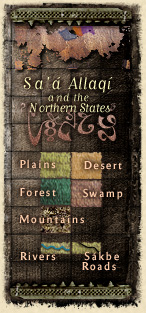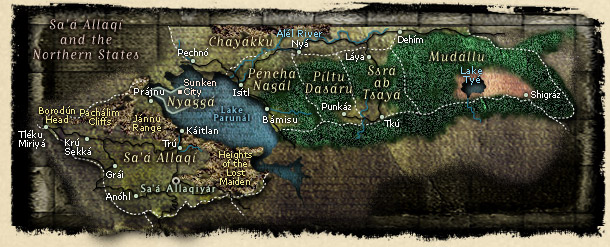 The Lands of Tékumel
The Lands of Tékumel
Sa’á Allaqí and the Northern States
Sa’á Allaqí and the far northeastern states of Chayákku, Péncha Nagál, Píltru Dasáru, Ssrá áb Tsáya and Mudállu.
Sa’á Allaqí is a clan-based matriarchal society; its king (Saá Allaqiyáni: Ssáo) is always male, but is elected for life by the elder women of the major clans, and the post is not hereditary. There is a semi-annual High Court held at Saá Allaqiyár for clan delegations.
A recent schism between the Priests of Light, who prefer the old ways, and new institutions rising up in imitation of the Yán Koryáni, may yet end in a religious war.

Chayákku has a similar system, but the monarch is a woman. The nation maintains a small national army and a few bodies of police, all supported by clan contributions and customs duties. Administration is simple, consisting of local clan-elders in the rural areas and a body of permanent officials at court at Pechná. Other governments of the northeast are founded upon warrior, priestly or plebian lineages; power passing from one lineage to another through lack of an heir, political intrigue, or even palace revolution.
The peoples of the northeast are similar to those descibed in Yán Kór, though bow-leggedness is a feature even more pronounced in these lands. Their ancient feuds are legendary: “Men act not because of themselves but because of some slight to their great-grandfather’s piss-pot”, the Tsolyáni say.
The faiths of the far northeast tend to be full of patriarchal father-gods, heroes, champions, and fertility goddesses—but these are underlaid with a darker, older, and more morbid strain which may date back to the pre-Engsvanyáli deities of Mihállu and the Plains of Glass. From Chayákku over through Nuru’ún one finds variants of the Two Brothers, Aridzó and Heshuél. These deities fought over their father’s patrimony, and one was killed. But here the traditions diverge: the people of Chayákku, Péncha Nagál, Píltu Dasáru, and Ssrá áb Tsáya all hold that it was Aridzó, the brother who was faithful to his father’s commands, who died, while farther east it is Heshuél who was slain. This schism has resulted in much political and religious friction over the millenia. The inticracies of these and related myths tend to leave the Tsolyáni theologians quite confused.
